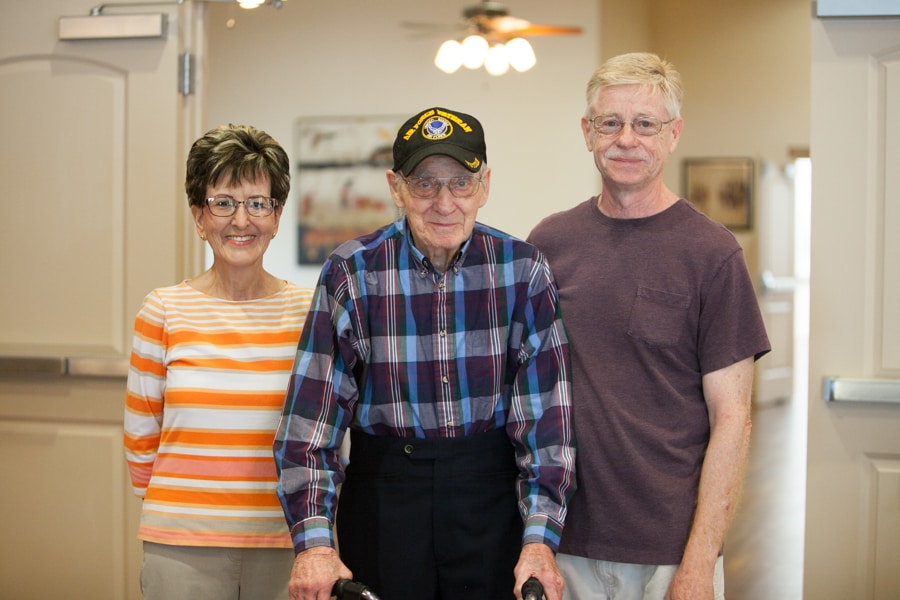The danger posed by COVID-19 weighs on everyone’s minds, although each of us can’t help but worry about our loved ones. And we worry about them, too. Many of Florida’s elderly live full- or part-time at assisted living or other long-term care facilities. While they may be safe from the dangers of coronavirus, a host of other issues like depression and loneliness become even more prevalent despite our staff’s best efforts. Our residents at Angels Senior Living have stayed strong without their families at their sides, but we believe it’s time to safely reunite you.
The state of Florida moved quickly to ban visitation to assisted living facilities and nursing homes because of the dangers posed by the coronavirus pandemic. And for months, the state of Florida has mentioned providing guidelines on assisted living visitation, but very little concrete guidance has appeared. We’ve seen feel-good stories about the heroic acts of people like Mary Daniel, who took a job at a nursing home so she could continue to see her husband. Several other states have since acted on visitation guidelines, but Florida has not.
This has to change. Our staff are ready to face this challenge and will have everything they need to help you see your loved ones, and keep everyone safe. We want to encourage the state to move just as decisively towards providing guidelines on how to keep our communities safe while giving our residents a way to spend time with their families. There are a few ways you can help. We want to give you some resources on what you can do to get back with your loved ones safely, sooner.
Sign a petition asking the state of Florida to provide guidance on visitation to assisted living facilities
The first way you can help us out is by making your voice heard. We’ve started a petition on change.org urging the state of Florida to provide guidelines for families to visit assisted living facilities. An example of these guidelines might include:
- Visits between family members and residents can take place if both parties wear full personal protective equipment (PPE) provided by the community, including masks, gloves, gowns, and face shields to prevent any potential spread of infection
- Family members can visit residents if they provide proof of a positive COVID-19 antibody test, indicating they’ve come in contact with the virus previously and are no longer infected, or at least two recent negative COVID-19 test results
- Family members can visit residents if visitation occurs outdoors with a glass partition separating family members from residents
These are just a few examples of what guidelines for safe visitation could look like. By signing our petition, you can endorse this request and help us return our residents to their loved ones.
Send a letter to the Florida Governor’s Office about assisted living visitation using this letter as a template to get started
You can also write a letter to the Florida Governor’s Office requesting action on family visitation. Here’s a template to get you started. This template includes a brief overview of some of the options above, in addition to mentioning the effects prolonged isolation can have on residents.
Please save the Word document to your computer, enter your own information where needed, and save as a Word document or PDF. You can send this document directly to the Office of Governor Ron DeSantis at https://www.flgov.com/email-the-governor/, or print and mail a copy to:
Office of Governor Ron DeSantis
State of Florida
The Capitol
400 S. Monroe St.
Tallahassee, FL 32399-0001
(850) 717-9337
Share our petition and letter on social media
You are free to share this petition or letter with your friends, employees, or family members. We encourage you to share this post on our Facebook page or make your own with your story about how you or your loved one has been impacted without being able to visit their assisted living or skilled nursing facility. Use the hashtag #togetheragain so we can see and share your story about being separated from your loved ones.
Want to do even more? Share our posts on Instagram, Twitter, LinkedIn, and elsewhere, or make your own to encourage the state to provide visitation guidance to us.
Contact your local representatives and the media to cover more stories about visitation to residents in assisted living facilities and nursing homes
You don’t have to stop there. Get in touch with the media or your local and state representatives to encourage the state to take meaningful action on restoring visitation. Our mission right now at Angels Senior Living is to bring mom and dad back to you safely, and it starts with action from the state of Florida. If you have additional questions about this petition or any of our communities, please do not hesitate to reach out to us. Updates about our COVID-19 response are available on our blog. We hope we can count on your support!






